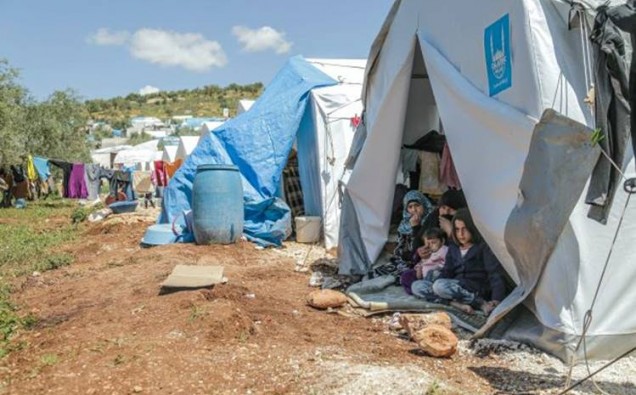Thursday 26 March 2020
(Thursday 26 March 2020) International aid charity Islamic Relief UK is extending its emergency coronavirus appeal to support the Middle East’s most vulnerable communities, including in Yemen, which today marks five years since the escalation of its humanitarian crisis.
Last week, the faith-inspired organisation released £500,000 for partner charities in the UK to support communities affected by the Covid-19 pandemic. It also launched an appeal to its supporters, asking them to fund more of this invaluable work.
Today, it is extending this appeal to reach some of the world’s most vulnerable communities in Gaza, Syria and Yemen, which now face outbreaks of the deadly virus.
Earlier this week, both Syria and Gaza reported their first cases of Covid-19. The World Health Organisation (WHO) is warning of a pending ‘explosion’ of cases in Yemen, where five years of war have weakened health systems.
Support for each country will include:
- Food assistance and grants for orphaned children;
- Hygiene kits including gloves, masks, toilet rolls, disinfectants and hand sanitisers;
- Awareness-raising leaflets on how to keep safe.
So far at least 170 countries and territories worldwide have confirmed cases of Covid-19, with 487,000 confirmed cases, although the likely number is in fact much higher than this due to limited testing capacity.
More than 22,000 people globally have died from Covid-19, and nearly 117,000* people have recovered from the virus.
Tufail Hussain, Director of Islamic Relief UK, said: ‘The coronavirus outbreak is gaining hold in the UK where at least 466* people have sadly already died. We remain committed to helping people right here in the UK.
‘But we mustn’t forget that this is a global pandemic that respects no borders, and it is the world’s most vulnerable communities – those already struggling with poverty, refugees and displaced people, people in conflict zones or recovering from natural disasters – who are most at risk. In crowded slums and cities, the poorest people in the world will be unlikely to self-isolate or to socially distance themselves in order to protect themselves and others.
Gaza
Hussain said: ‘Places like Gaza, which this week reported seven cases of Covid-19 within one of its quarantine centres, are particularly vulnerable. Gaza has a lack of equipment, testing devices, and quarantine facilities. Years of socioeconomic decline, embargoes, conflict and closure have left the health sector lacking adequate physical infrastructure and adequate healthcare.
‘Islamic Relief is one of the biggest NGOs operating in Gaza, and is raising money to support the people in Gaza directly or by providing quarantine centres with food, water, hygiene equipment, and medical supplies. We are also raising money to support authorities with general public health measures to try to prevent the spread of the outbreak, such as disinfectant material and protection tools and skilled workers for sterilisation.’
Yemen
Today marks the fifth anniversary of the escalation of the crisis in Yemen which has decimated health systems, making people vulnerable to an outbreak of Covid-19.
Hussain said: ‘There are now cases of Covid-19 confirmed in all of Yemen’s neighbouring countries. This poses a huge risk to the country. Currently, there are only thirty beds available in one hospital in Sana’a, with an additional 20 beds provided by the WHO. Other than this, there are no isolation facilities available.
‘Support is needed to establish isolation facilities with required staff and supplies; to provide laboratory solutions to test Covid-19 cases; to provide healthcare workers with personal protection equipment and Covid-19 case management training; and to conduct public awareness on the prevention and control of Covid-19.’
As well as continuing its existing programmes in Yemen, Islamic Relief will be working across several governorates to establish quarantine centres and distributing supplies to them; distributing medical supplies, including personal protection equipment, to health facilities; and building capacity of healthcare workers in case management and infection control.
In terms of prevention, Islamic Relief will also be training and supporting community health volunteers; distributing sterilisation materials and hygiene messaging.
Syria
As of yesterday (March 25), five cases of Covid-19 were announced by the Syrian Ministry of Health and aid organisations are concerned for people living in Northwest Syria, where nine years of the crisis has decimated infrastructure.
Since fighting in Idlib escalated on 1 December:
- nearly 1 million people have been displaced including 800 thousand women and children;
- at least 500 civilians have been killed;
- more than 84 hospitals and medical facilities have been damaged, destroyed or forced to close due to violence or mass shortages of staff or supplies.
Ahmed Mahmoud**, Islamic Relief’s Syria Country Director, said: “The situation in Idlib is dire, people are exhausted, hungry and afraid. The health system has been shattered by the violence and mass displacement and it is already struggling to cope. We’re very concerned that if the coronavirus reaches Idlib this humanitarian catastrophe will only get worse.
‘There are already mass shortages of beds, ventilators, medicine and proper equipment. People’s immune systems have been systematically worn down by the violence and years of malnutrition and poverty. With so many people crowded into squalid and unhygienic camps – the conditions are rife for an outbreak that we simply do not have the resources to handle.’
Islamic Relief’s emergency coronavirus response programme in Syria will focus on increasing awareness of the general public as well as healthcare staff in the prevention and treatment of the infection and increase the ability of the healthcare system of northwest Syria to deal with the pandemic if it infects the population.



















